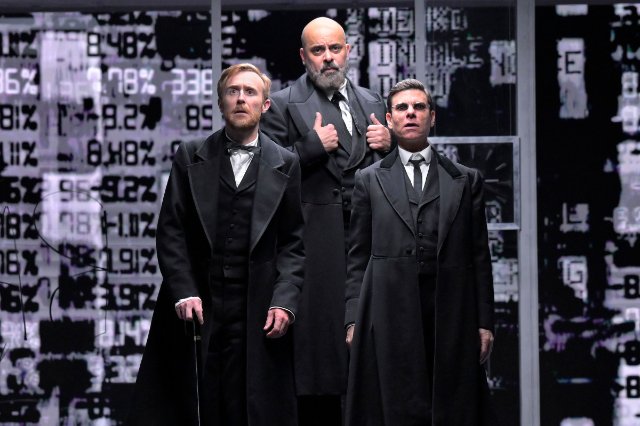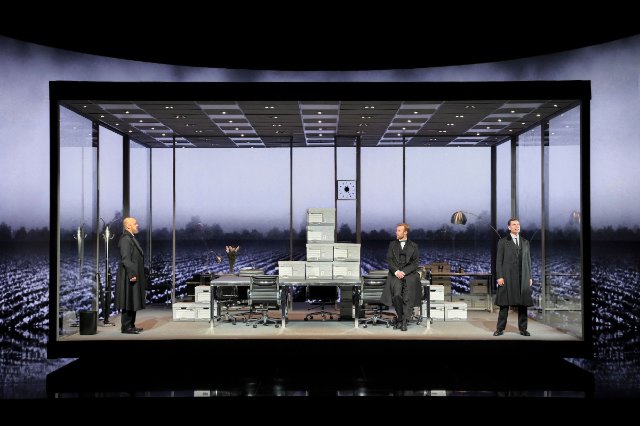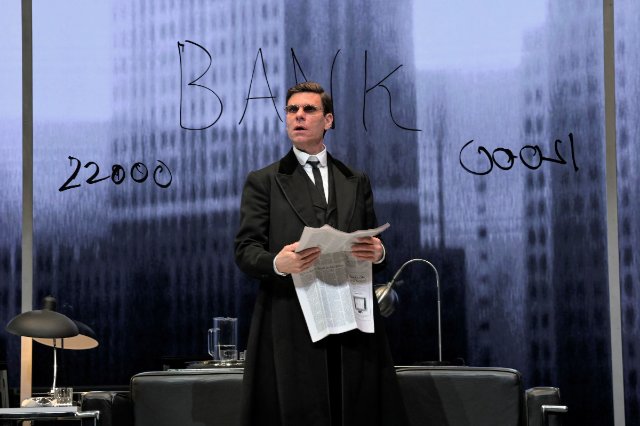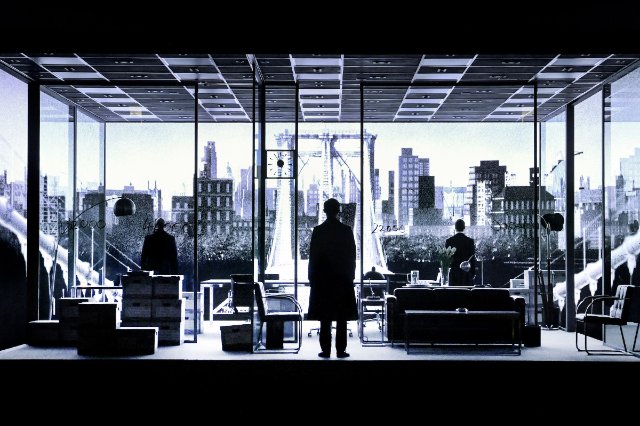The Lehman Trilogy at ACT
From Immigrant Family to Wall Street Tycoons
By: Victor Cordell - May 30, 2024
E strano (it’s strange) on the surface that Stefano Massini, an Italian author, would become so engaged in an American family’s history to compose an epical life-cycle work of the Lehman Brothers, Inc., seemingly sterile ground for theatrical drama. Started by three German-Jewish brothers who emigrated to the United States in the mid-19th century, the Lehman business began in cloth retailing in Montgomery, Alabama.
But the Lehman bloodline always possessed creative entrepreneurs and opportunists. Their enterprise would evolve into cotton brokerage, stock and commodity trading, and eventually become the fourth largest investment bank in the United States before its dramatic demise in 2008. Its bankruptcy, which was largely the result of investment in sub-prime mortgages, shook markets, both as a cause and an effect of the complex financial meltdown of 2008.
ACT presents this massive co-produced project. Among other recognition, the Sam Mendes directed play has received multiple Tony and Olivier awards. The storyline contains compelling elements, and the production brims with artistic ingenuity, yielding a powerful theatrical experience.
The plot is divided into three timeline segments. An interesting mix of storytelling monologues and interaction among the characters enlivens the action. Although the overall arc is dramatic, it is punctuated by comic interludes in which otherwise dry dialogue transforms into dry humor as a result of deft timing.
The first and most engrossing part concerns the origin story, the first generation’s building the business and their clashes of personalities and objectives. Henry (John Heffernan) was the founder and characterized as the brain. While the Lehmans would become famous as investment bankers, their real contribution to innovation, initiated by Henry, was creating the brokerage function between southern cotton growers and northern mills. He often differed with Emmanuel (Howard W. Overshown) who was the arm that got things done. The youngest was Mayer (Aaron Krohn), known as the (peeled) potato for his smooth skin, who was the conciliator. It was he who saw the opportunity after the Civil War to create a bank in Alabama with state government money to facilitate economic reconstruction.
Anticipating Act 2, Emmanuel first planted the family flag in New York. It would be his progeny that would guide the company through the next phase – first, fast-talking, locked-focus son Philip (portrayed by Heffernan). His analytical thinking extended to evaluating prospective wives by a set of criteria, and he humorously pitches his proposal to the chosen one on a weekly basis until she finally submits. The final anointed Lehman is horserace-obsessed grandson Bobbie (portrayed by Krohn) who despite diversions, puts his Yale education to good use. Stage 2 lasts until Black Thursday, the stock market crash of 1929, which the firm survives. This era captivates with the depiction of highly animated personalities and the company becoming what it would be known for.
The last chapter of the play and of the company witnesses the final years of Lehman family control with the sellout of ownership; the management by outsiders; and the end. After the audience has become involved with the rise of a great American family, the period of “professional” management lacks that connectedness. In addition, the brisk and uneven passage from 1929 to 2008 doesn’t allow the audience to get a feel for the times. Finally, some in the audience may suffer from wearout in this final phase. Why? The run time is 3 ½ hours. Thankfully, it was condensed in Ben Power’s adaptation from its original 5-hour form.
While plotline drives most theatrical dramas, “The Lehman Trilogy” draws power from its staging conceits, the first of which is using three actors to portray all of the roles. Fortunately, each actor’s versatility makes for a master class in characterization as each is excellent in many depictions. They play their own descendants; their counterparties from farmers to politicians; as well as children and women in their lives, to great hilarity.
That final group presents a conundrum. In an age of diversity, a female cast member should unquestionably be written in. As it is, many a laugh is generated by male actors overplaying females. A female in those roles would demand different acting, directing, and dynamics, but that would be welcomed.
The unique staging adds another character to the mix. Most notable is that although the narrative spans over 150 years, Es Devlin’s stunning single stage is unchanged throughout. The skeletal glass and steel set gives an authentic modern Wall Street look, and it works even in the telling of stories from an earlier time. This box rotates, creating a strong sense of movement and allowing different perspectives on the same scenery.
Another powerful aspect of the look of the stage is the use of Luke Halls’ full backwall projections which variously depict everything from skylines to fiery skies to moving arrays of stock ticker prices. Actors remain in the same garb throughout – 19th century three-piece black duster suits which suggest tradition even within the modern world.
Composer and Sound Designer Nick Powell has created a soundtrack for solo piano that can haunt, humor, provide repetition, and more. Meanwhile, sound effects throughout echo the events of the times.
As acclaimed as “The Lehman Trilogy” is, there are two types of objections that have received attention and deserve comment. First is the fact that historical records show that Henry had two domestic slaves for five years, and Emanuel had several in their warehouse, though nothing further is known of them or their treatment. This is not mentioned in the play. Whether this should have been revealed is up to the reader to decide.
Another concern is that the play is actually antisemitic, and in the argument of one reviewer, it seems to be about Jews who become bankers rather than bankers who happen to be Jewish. Religious reference is not overstated, as religion was more important in the 1800s, particularly to the oppressed. The play also notes that in the 20th century the Lehmans became Reform Jews, which, as a monologue says, means do what you want. And shiva (Jewish mourning including a cessation of business) for Bobbie was three minutes at the company, while historically the firm held it for three days.
Also, note that although Stefano Massini was Roman Catholic, he went to Jewish school in the afternoons during his high school years in Italy; learned Hebrew; and developed his interest in history there. By Jewish law, Producer/Director Sam Mendes is Jewish, as he was born to a Jewish mother. Case closed.
“The Lehman Trilogy” could be much shorter. For instance, detailing stockbroker suicides to monotonous clock ticking adds to the fade effect by Act 3. Nonetheless, it is a riveting and important piece of theater history about an important piece of American history very much worth seeing.
“The Lehman Trilogy,” written by Stefano Massini and adapted by Ben Powers is produced by American Conservatory Theater in co-production with the National Theatre and Neal Street Productions, and is performed at Toni Rembe Theater, 415 Geary Street, San Francisco, CA through June 23, 2024.







